Gil Sharone on drumming for Marilyn Manson
The versatile sticksman reveals all about his latest gig with the Pale Emperor
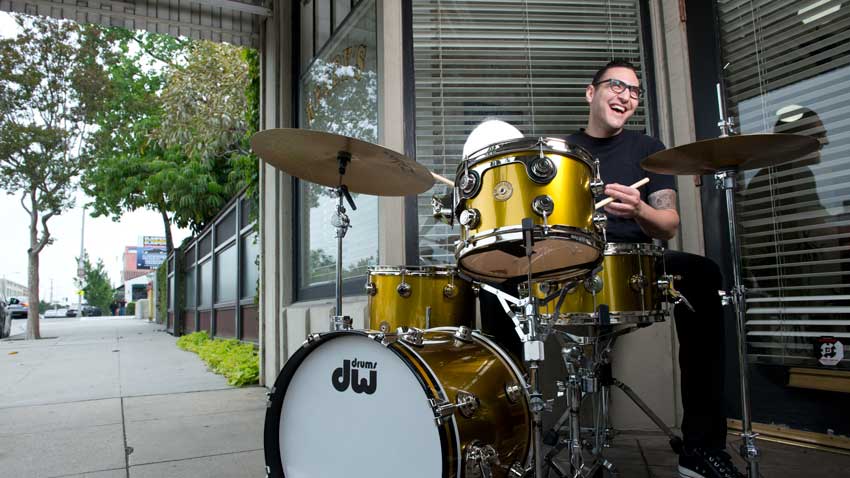
Gil Sharone
Whether pummeling impossible rhythms with Dillinger Escape Plan, laying the atmospheric beats for Tool frontman Maynard James Keenan’s side project Puscifer, or vibing on rocksteady ska licks on his 2010 DVD Wicked Beats, Gil Sharone tackles drumming with well-studied authenticity. These starkly different percussive scenarios should give you an impression of the spectrum his talents cover, but it’s just a small insight into his career so far. Gil also has his own band, the theatrical, experimental Stolen Babies, and he’s a mover and shaker on the LA session scene.
Most recently he’s joined the ranks of shock rocker Marilyn Manson’s touring army of weirdos and recording the big beats on Manson’s comeback album The Pale Emperor. Manson’s off-stage notoriety aside, it’s an unpredictable gig that requires concentration, commitment to the original drum parts and sound, and the ability to put on a show, a role Sharone has slipped into comfortably.
Here Gil fills us in on just what is required for the Marilyn Manson drum gig.
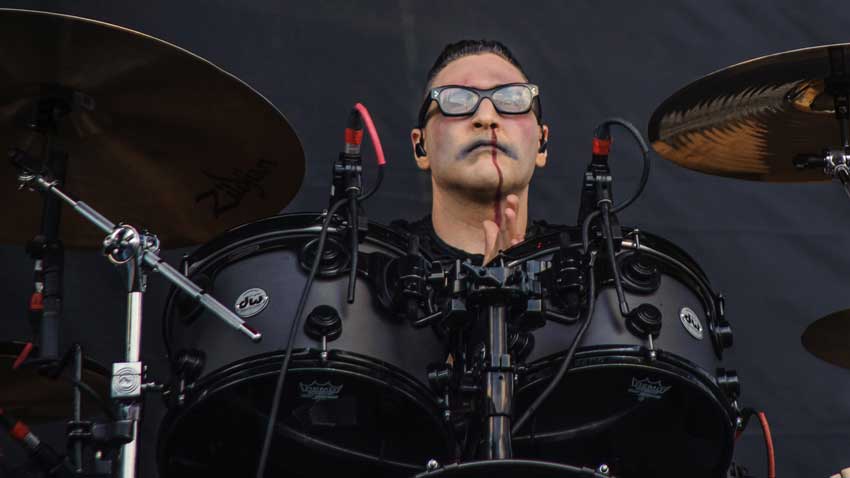
Great expectations…
“I knew what I was walking into. I usually go by what the vibe is with the people I’m working with. Manson and I got along right away and the vibe was cool. All of the other stuff that gets thrown in comes with the territory of a gig like this and it’s always entertaining.
“I was called to play on the record by Tyler Bates who produced and wrote the record with Marilyn Manson. I met Manson for the first time when he dropped by the studio while I was tracking. He told me that he wanted me to be in his band on the spot. He said, ‘You’re the drummer I want in my band.’ There was no audition or anything like that. A few months later the band got together and started rehearsing for our first batch of shows. It’s been pretty non-stop since then. It’s a fun gig.
“When I got called in everything was recorded except live drums. All of Manson’s vocals, and Tyler played all the guitars, bass, keys and did the programming. It was cool tracking that way. The programmed parts were a perfect guide for me to work with and Manson’s vocal performance
is really strong on the album, it was inspiring to hear them while I was recording. The timing to do the session worked out at the last minute. I was about to leave on tour with my band Stolen Babies later that week when Tyler called me to do the record. I went to his studio that night to listen to
the songs and the next day we jumped in the studio. I did the album in a day and a half with enough
time to pack for the tour.”
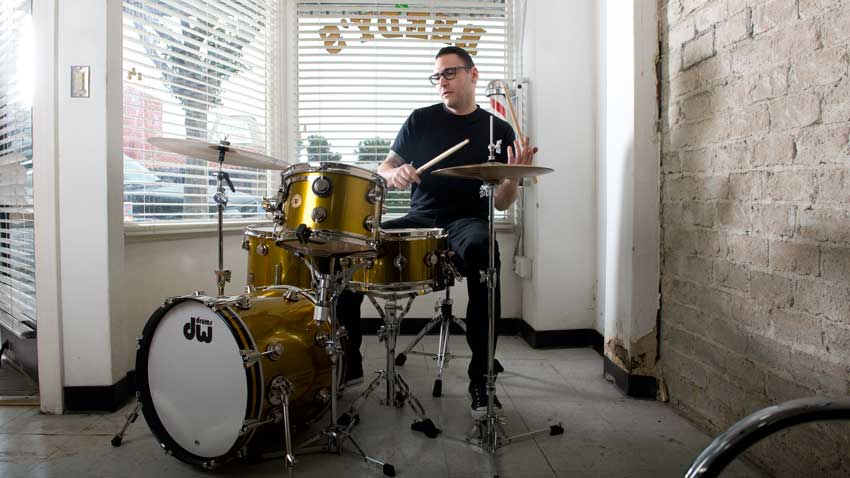
All about the shuffle
“I really liked the songs and I felt confident in what to play and how to play it. The only directionI got before the session was when Tyler said, ‘This isn’t a flashy drum record, it’s not about playingbusy parts and fills, it’s all about the groove and you naturally have the right feel.’ He also emphasised the importance of the shuffles feeling right. They’re all over the album and they need to bounce. It was obvious to me how to approach the session as soon as I heard the material, plus I love playing shuffles!”
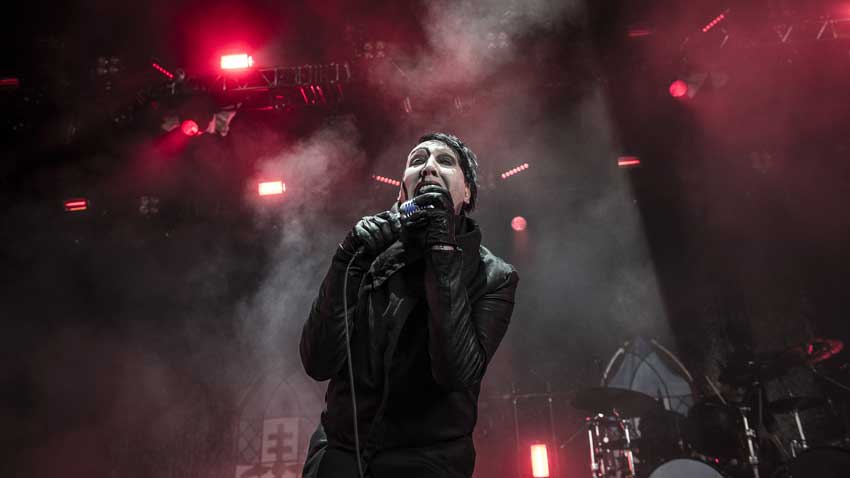
Don't confuse the strippers…
“The only thing Manson has ever said to me is ‘don’t confuse the strippers’, which is a funny way of saying ‘keep it steady and don’t interrupt the flow’. Everything else has been pretty open to my interpretation. It’s not like I’m reinventing parts to songs that span over a 20-year catalogue. There are so many signature patterns in the material and it’s important to maintain the authenticity. I have modified certain parts in the older material that Manson liked but my approach to the gig is to make the songs feel the best they’ve ever felt.
"Twiggy [Ramirez, bass guitar] and I lock in really well together too. He’s been playing most of these songs for years on either bass or guitar and he’s commented on how they feel new to him because of the pocket they have now. The pocket is so important to me with anything I’m playing. You can really feel the crowd respond to a band that grooves hard and it’s an awesome feeling, especially playing for massive festival crowds.”
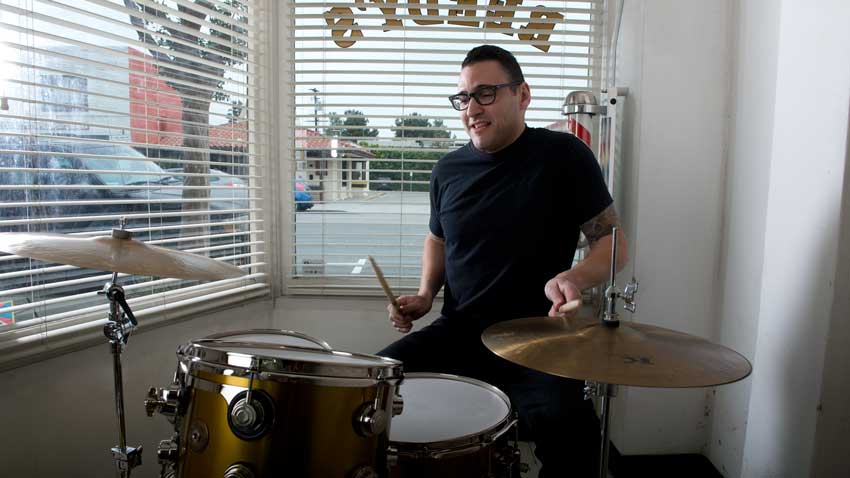
A more rock'n'roll direction…
“I heard the rock’n’roll sound right away and a strong blues influence too. Also, becauseof Tyler’s background as a film composer, there is a strong cinematic theme throughout the album.I like that the album has a variety of feels and tempos on it. Some songs are straightforward and some of them have more complex forms to them. All of the songs from the record that we’ve been playing live translate really well and have been getting a great response. They’ve taken on a great live energy. Songs like ‘Killing Strangers’, ‘Deep Six’ and ‘Third Day Of A Seven Day Binge’ are some of my favourite ones to play.”
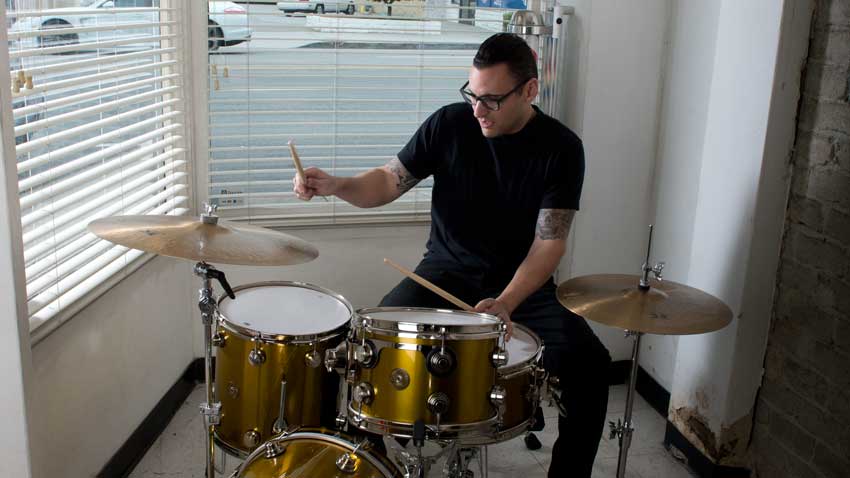
The right gear…
“Tyler and the engineers that worked on the record did an amazing job with it. I made sure I had the right gear for the record. I knew exactly what cymbals to bring which is important to me, and for drums my buddy Jeremy Berman [from Q Drums] tech’d for me on the session. We messed around with a couple of different set-ups and went with the one that sounded best in the room. After that, it’s all about getting a great performance and mixing. Tyler knew what drum sound he was looking for and how to get it.
“I always have a good time putting together new set-ups from gig to gig. I’m debating on adding a rack system to the Manson kit or just leaving it the way it is. I love the set-up I’m using now. I always want whatever gear I’m using to fit the style and vibe of the gig I’m playing. My Manson kit is perfect for the gig sonically and visually.
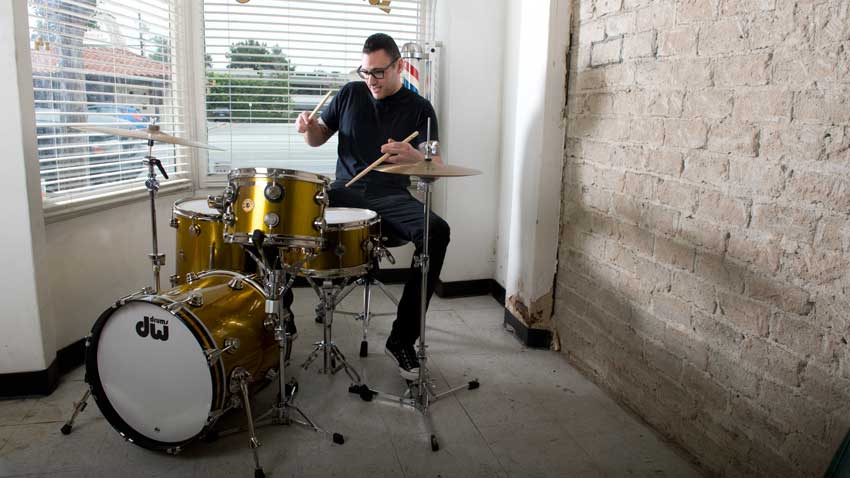
Trigger unhappy…
“I actually requested to remove the triggers on the drums when I joined Manson. This is the first time in years that there aren’t triggers on the drums. I’m not really a fan of them unless it’s 100 percent required for the gig. Our sound man was a little hesitant at first but then he heard how massive my kit sounded without triggers and it’s been cool ever since. Most of the electronic sounds with Manson are already being played on the programmed tracks so I just need to play acoustic drums. I might bring some pads in at some point.
“I’ve used triggers before in other settings like with Puscifer where they were triggering custom sounds and I am all for that. As far as it being important to know about electronics, I think it’s good to know as much as possible about your craft and the equipment you can use but if someone doesn’t feel the need to work with electronics that’s cool too. I try to stay up on whatever it is that would be used for a gig. I also engineer and know Pro Tools which has always been a helpful skill to have.”
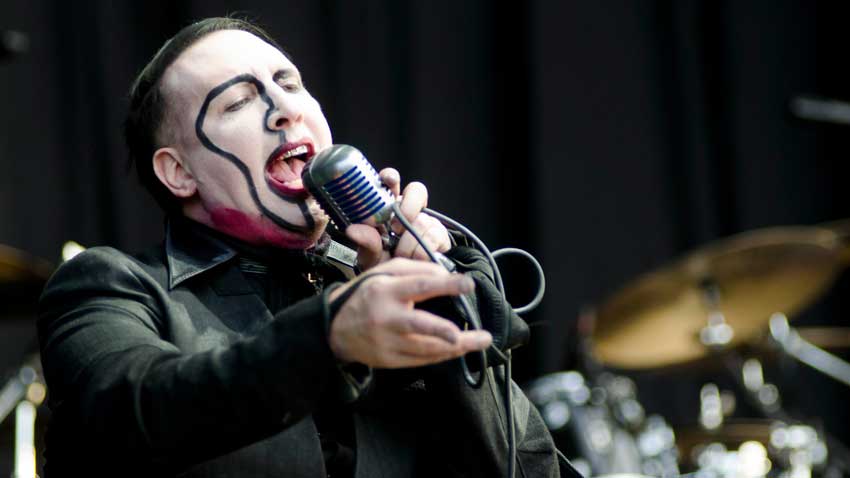
A fun gig…
“The main factor that makes playing in Marilyn Manson different than other gigs I’ve done is thatI’m playing for Marilyn Manson [laughs]! He’s an icon and really one of the last true rock stars left. There’s never a dull moment and it’s always unpredictable in a good way.
“I get asked by a lot of players if I get bored because they know me for playing more extreme music or being capable of stretching out and this gig is more straightforward. I say not at all! Not only is playing in Manson a lot of fun for me but it’s a challenging gig that most players would find really intimidating. You have to be ready for anything at all times. The level of intensity on stage is insane and no matter how distracted you might get, you have to stay focused on driving the band, playing to a click, watching for cues… I like that unpredictable element. It makes it exciting for the crowd and the band.
“Besides working directly with Manson, the other aspects of the gig are pretty similar to any other professional gig. The same rules apply and that’s to do your job. I don’t forget what I’m there for.”
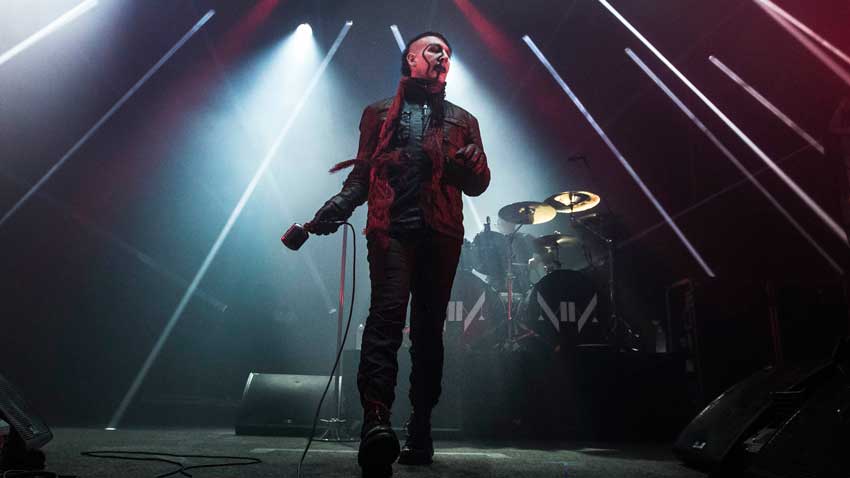
A natural showman
“I don’t really think about it. I know that I’m an expressive player. I react to how the music makes me feel. I don’t play a certain way for the sake of being theatrical but I’m also not a stiff [laughs]. I like to move with the pocket. If I have exaggerated hand motions or broad strokes it’s because technically it works and emotionally there’s a feeling that makes it happen.
"I’ve always been aware of how I flow around the kit and making it feel natural. I’m not going to play a straight-ahead jazz gig like I would a metal show. The styles make me react completely different to how I approach the kit. No matter what, I always stay relaxed and keep proper body mechanics and technique ingrained in my playing. Martial arts are a big influence to me in those regards as well.”
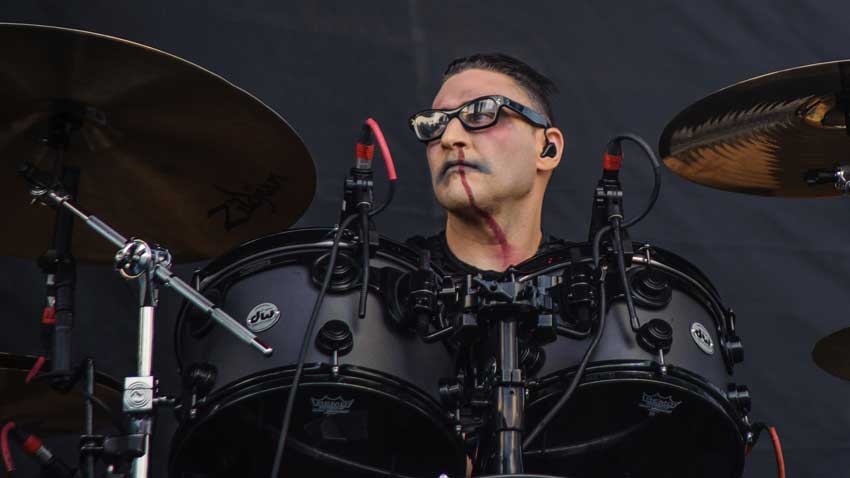
Tips for the click…
“I play to a click all the time and love it. Almost every session and live gig I do requires me to play to a click. Most of Manson’s set is to a click. I’m also a fan of playing slow tempos and I talk about the importance of being able to do that in lessons and clinics. Slower tempos are much harder to play than fast tempos. Slow tempos also expose a lot of weakness in someone’s playing. The space in between the notes needs to feel just as comfortable as the notes you’re actually playing.
“The best way to master playing at slow tempos is to play at slow tempos! No matter what style of music you like, practise grooves in that style at tempos all across the BPM range from slow to fast. It’s also good to record yourself and listen back. You’ll find all sorts of things to fix.”
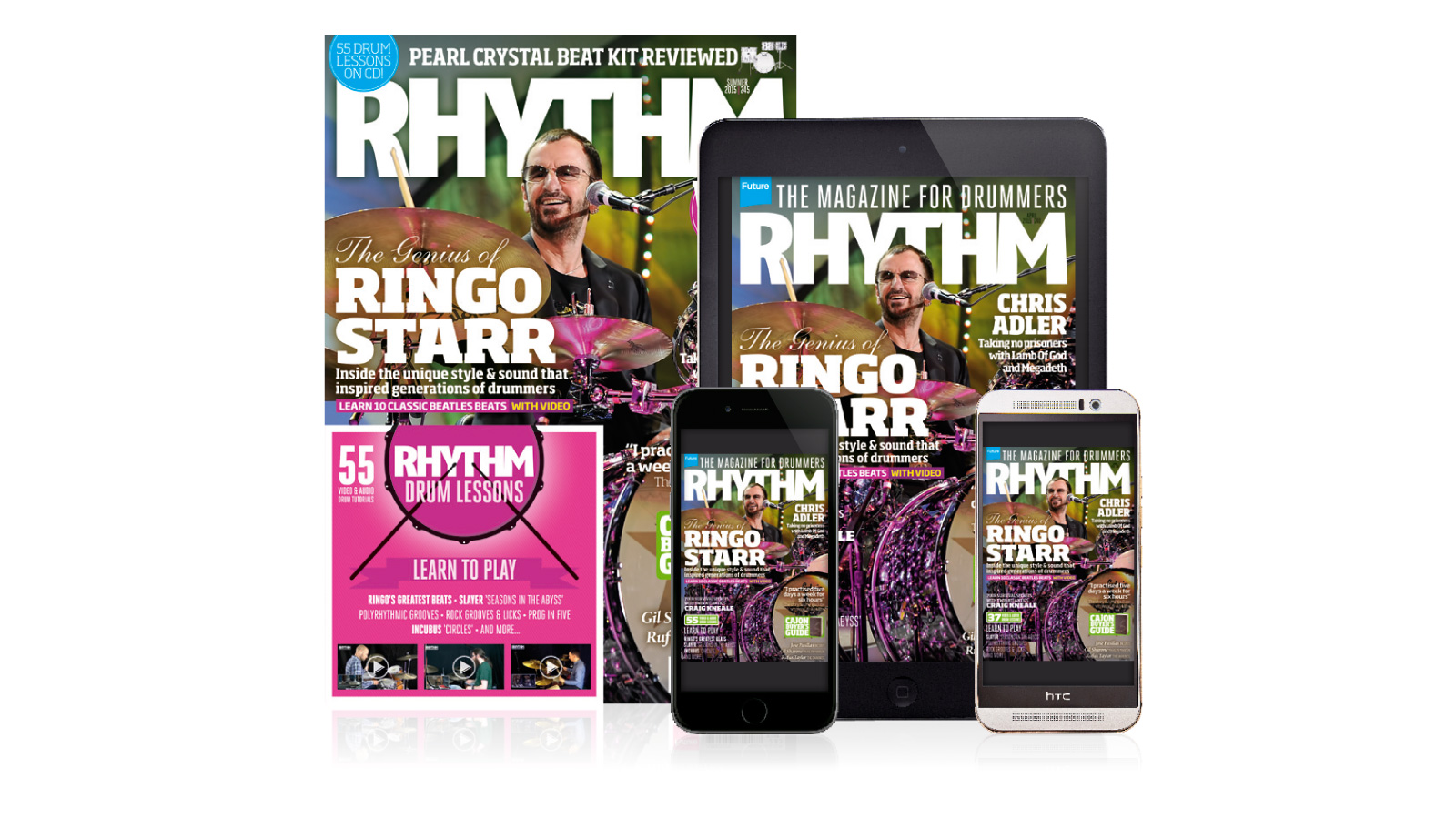
Want more?
Read interviews with the world’s greatest drummers every month in Rhythm magazine, available here!
I'm MusicRadar's eCommerce Editor. In addition to testing the latest music gear, with a particular focus on electronic drums, it's my job to manage the 300+ buyer's guides on MusicRadar and help musicians find the right gear for them at the best prices. I dabble with guitar, but my main instrument is the drums, which I have been playing for 24 years. I've been a part of the music gear industry for 20 years, including 7 years as Editor of the UK's best-selling drum magazine Rhythm, and 5 years as a freelance music writer, during which time I worked with the world's biggest instrument brands including Roland, Boss, Laney and Natal.
